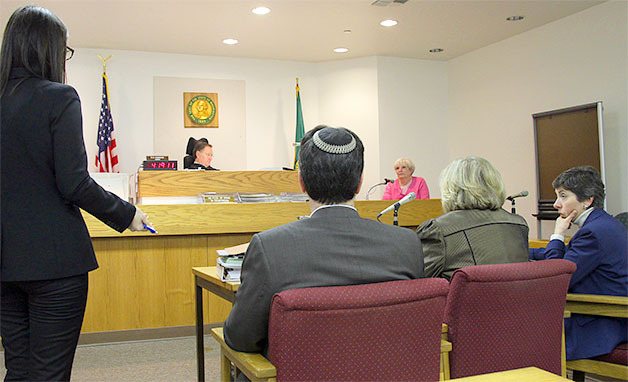An attorney for Whidbey General Hospital is aiding in the defense of an administrator accused of assaulting a patient, despite prosecution objections.
Seattle attorney Donna Moniz sits at the defense table in Island County District Court with Linda Gipson, the chief nursing officer who is facing a fourth-degree assault charge.
Gipson has her own defense attorney, Andrew Schwarz of Seattle, but Moniz has argued alongside him on many issues before the court.
Prosecutors questioned the hospital’s attorney’s continued involvement and unsuccessfully tried to limit her participation.
“The circumstances of this litigation are certainly unusual,” Island County Deputy Prosecutor Jacqueline Lawrence wrote in a motion before the court.
“A public hospital district appears ready to use public resources to thwart the publicly funded criminal justice system from administering justice.”
Island County Prosecutor Greg Banks echoed Lawrence’s sentiments.
“We are not prosecuting the hospital,” he said. “I wish someone on the hospital board would explain why they are using hospital resources to oppose this prosecution.”
Moniz is costing the public hospital $325 an hour.
Judge Bill Hawkins ruled that Moniz has standing in the case. Hospital officials and their attorneys said Moniz is at the table to protect the hospital’s interest.
In court documents, Moniz pointed to an ongoing civil lawsuit against the hospital regarding the alleged assault and potential for “privilege issues” to come up in a deposition. Schwarz said Moniz is present to protect the hospital in ways he cannot.
When asked why prosecuting someone accused of a crime isn’t in the public’s interest, Moniz said that the hospital’s position was set by outgoing hospital CEO Tom Tomasino, who publicly stated early in the case that he believes Gipson is innocent.
Tomasino testified during an earlier hearing that he never actually read the hospital’s investigation into the allegations, but that a fellow administrator spoke to him about it.
Ron Wallin, a member of the hospital board, looked into the issue after being contacted by the Whidbey News-Times. He said the hospital’s attorneys advised the administration that someone should be at the court hearings to look out for the interests of the hospital.
The hospital board passed a resolution years ago that obliged the hospital to defend members of the administration in court cases, which he was told includes criminal cases, Wallin said.
“From what I understand, this is pretty much standard throughout all the hospitals in the state,” he said.
Moniz has been successful in arguing for the hospital.
Moniz and another attorney for the hospital first became involved in the case after the prosecution subpoenaed the hospital for an investigation into the allegation that Gipson assaulted a restrained patient last summer.
But Moniz continued her involvement into the case after Hawkins ruled in the hospital’s favor.
Lawrence filed a couple of motions in attempts to prevent Moniz from taking part in the criminal case. Moniz insisted on being present when Lawrence tried to interview one of the witnesses, which the deputy prosecutor argued was inappropriate since Moniz is allied with the defense.
Lawrence wrote that three of the witnesses, who are hospital employees, stated that they felt intimidated by the hospital administration; two of the witnesses included the hospital’s legal counsel among those whom they felt were intimidating.
One of the nurses asked Moniz to leave during an interview with the state Department of Health.
Moniz successfully argued that she should be allowed to attend a witness’s deposition at the witness’s request.
She wrote that the deputy prosecutor’s accusations against her were groundless.
“It is this attorney’s practice to confirm witnesses’ obligation to tell the truth,” she wrote.
“Hysteria, innuendo and baseless opinions are rampant in this case.”
Hawkins has ruled in the defense’s favor on important issues, but he also questioned hospital representatives on some of their actions.
Hawkins asked an attorney why the hospital made efforts to protect the hospital’s investigation from the prosecutor but didn’t attempt to protect the alleged victim’s medical records from the defense attorney.
Over the prosecutor’s objections, Hawkins ultimately allowed the defense to have access to the alleged victim’s hospital records.
Later, the deputy prosecutor tried to subpoena a nurse’s medical records in an attempt to impeach Gipson’s story about the patient assaulting the nurse.
The hospital objected to the release of the records because of privacy concerns.
Hawkins sided with the hospital.
Schwarz said it is perfectly appropriate for Moniz to take part in the case. He said there are “certain issues” she will address in order to protect the hospital from the prosecutor’s reach, such as the privacy of medical records.
Schwarz said he believes the prosecutor and police have been politically motivated in going after Gipson and that there are issues involved that have nothing to do with his client.
“This case would not have been charged in any other county,” he said.
During a hearing earlier this month, Schwarz successfully argued to have the trial moved to April.



